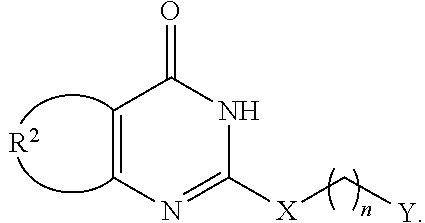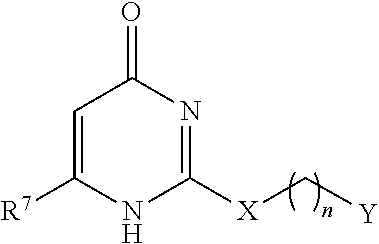Matrix metalloproteinase-9 hemopexin domain inhibitors and methods of treatment using same
- Summary
- Abstract
- Description
- Claims
- Application Information
AI Technical Summary
Benefits of technology
Problems solved by technology
Method used
Image
Examples
example 1
and Characterization of Compounds 1a to 4e
N-(4-Difluoromethoxyphenyl)-2-(4-oxo-6-propyl-1,4-dihydropyrimidin-2-ylthio)acetamide (1a)
[0098]To a solution of bromoacetic acid (170 mg, 1.25 mmol) and EDC.HCl (239 mg, 1.25 mmol) in dichloromethane (6 mL) was added aniline (5a, 200 mg, 1.25 mmol) and stirred at room temperature overnight. After the completion of the reaction, the reaction mixture was diluted with dichloromethane and washed twice with 1 N hydrochloric acid, twice with saturated solution of sodium bicarbonate and twice with brine. The organic layers were collected, dried over magnesium sulfate, filtered and concentrated to afford an off-white crude product. The crude product was recrystallized from hexanes / dichloromethane to give bromoacetanilide 6a as white solid (227 mg, 65% yield): 1H NMR (300 MHz, CDCl3) δ 4.27 (s, 2H), 6.30-6.79 (s, 1H), 7.21 (d, 2H, J=9 Hz), 7.63 (d, 2H, J=9 Hz).
[0099]To a solution of sodium hydroxide (7.2 mg, 0.18 mmol) in water (2 mL) was added 2-hy...
example 2
t of the Affinity of Compounds for PEX-9 Binding
[0127]A blue shift in proMMP-9 tryptophan fluorescence was monitored to determine the binding affinity of all compounds. Binding of a test compound to MMP-9 was assayed by observing the change of tryptophan emission upon binding. Purified recombinant MMP-9 (50 nmol / L) or MMP-9 / MMP-2PEX (50 nmol / L) was diluted in buffer (50 mmol / L Tris-HCl, 60 mmol / L KCl, and 0.05% Tween 20, pH 7.4) in the presence or absence of the test compound. As a control for protein stability and loss, an analogous buffer solution was added to the protein. The protein sample was excited at 280 nm and emission scans were collected from 290 to 400 nm, using slit widths of 0.3 nm on a QM 4 / 200SE spectrofluorimeter with double excitation and emission monochromators. Three emission scans were collected and averaged at each concentration. The Kd was determined using the Prism software package (GraphPad V5) to fit the data to Equation (Δ).
λmax=(λmax∞×[2]) / (Kd+[2]) (A)
in...
example 3
t of the Inhibitory Activity of Test Compounds for proMMP9-Mediated Migration
[0129]COS-1 cells were chosen for this set of experiments due to their low migratory capacity and complete lack of MMP-9 expression thereby minimizing potential artifacts when interpreting the data. Overexpression of proMMP-9 results in enhanced cell migration in a two-dimensional dot migration assay. This assay was initially used to test the efficacy of analogs at a single concentration, 50 μM. This concentration was used as a maximal cutoff because concentrations above 50 μM compound 1a did not increase inhibitor effectiveness in COS-1 cells.
[0130]Cells were mixed with type I collagen solution with or without compound, dotted onto a 96-well plate, and allowed to migrate for 18 hours. They were then fixed, stained and scored for extent of migration. 2-(4-Oxo-6-propyl-1,4-dihydropyrimidin-2-ylthio)-N(methyl)-phenylacetamide was used as a negative control. The results are summarized in Table 1 shown above.
[0...
PUM
 Login to View More
Login to View More Abstract
Description
Claims
Application Information
 Login to View More
Login to View More - Generate Ideas
- Intellectual Property
- Life Sciences
- Materials
- Tech Scout
- Unparalleled Data Quality
- Higher Quality Content
- 60% Fewer Hallucinations
Browse by: Latest US Patents, China's latest patents, Technical Efficacy Thesaurus, Application Domain, Technology Topic, Popular Technical Reports.
© 2025 PatSnap. All rights reserved.Legal|Privacy policy|Modern Slavery Act Transparency Statement|Sitemap|About US| Contact US: help@patsnap.com



